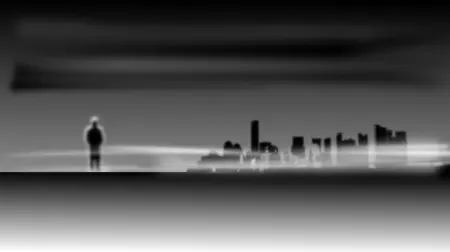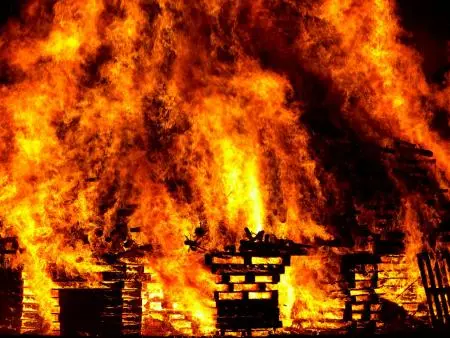First up this episode we have gingermutt with the following paragraph:
The world lingered in a hushed gloom of perpetual twilight where the sun had forgotten to rise, night had yet to fall, and human existence had faded into a forgotten silence. The vague silhouette of the Drifter was barely contoured against a skyline that hinted early dusk, a silent witness to the condemnation of the heavens. He stood now upon the crumbling edge of a formerly grand structure, a triumph of human domination, now nothing more than a vacant reminder of humanity’s fall. The world had been burned alive, the myriad accomplishments of humanity extinguished, and the wreckage left in their wake was no more than a fleeting tombstone of humanity’s ephemeral achievements, the evanescence of their lives. The Drifter thought on this and laughed. It was a harsh laugh, weighed down by the pains of experience, but it was not without its forgiveness. His body was tall but powerful, and his poise suggested class and stature not commonly associated with the grimy attire he wore, stained with dust and dirt. To him though, it seemed appropriate. Despite the argent hue of his hair, he must have appeared as he had in his youth, a soldier drawn across the battlements, blood and dirt and sweat caked into his very skin. At the end of all things, he had finally returned to war. Perhaps it’s too late to fight, he thought, too late to do anything.
gingermutt says: After taking a year off to focus on school, I returned to my dusty sci-fi/fantasy/post-apocalyptic manuscript and started rereading. I feel very conflicted about the opening, but beyond that, I admittedly don't know what my editing goal is here. My initial intention when writing it was to convey a great deal very quickly (setting, theme, and character), but I feel like I only succeeded in trying to do too much at once. A friend who read it and referred to it as 'try-hard,' which was very much not my goal.
I think what your friend was getting at was the fact that there are a lot of adjectives, adverbs and hyperbolic language in here. So much so that what you’re trying to convey becomes muddled. Ultimately, while there is a certain feel of foreboding from the choice of descriptors, there isn’t enough concreteness to glean much about the story. If I were to simplify what is being conveyed, this is what it boils down to: For some reason it is perpetually dark-ish, but not all the way dark. Humanity has been wiped out—except for this Drifter guy.
There is also some redundancy in your descriptions:
- Gloom, perpetual twilight, sun forgotten to rise, night had yet to fall, skyline hinted at early dusk—these are all describing the same thing five times in two sentences.
- Vacant reminder of humanity’s fall, world has been burned alive, myriad of human accomplishments extinguished, wreckage is a fleeting tombstone of humanity’s ephemeral achievements, evanescence of their lives—again, five descriptions of the same thing, but none of these is terribly concrete.
I would consider giving more hints about what actually happened and what things actually look like. The flowery language is essentially throwaway—it isn’t doing anything as far as making the story clear. It’s only cluttering the space up with big words, none of which have concrete enough meaning that we can attach them to anything. I wrote an article about using too many fancy words recently, so I’ll refer you to that here.
Note that in my revision, I’m likely deviating from what your story is actually about, so consider this as just one example of how you might go about making the picture clearer and more concrete.

Revision:
The world had been plunged into a perpetual twilight for the last decade since the war ended. Clouds of ash and debris filled the sky, blocking the sun, while the fires burning across the ruined cities prevented total darkness. All was silent except the wind and the distant crackling of flame. Nearly every last person was dead, buried beneath the rubble of bombed buildings. Only the Drifter stood silhouetted against a dim skyline. Though his clothes were ragged and covered in dirt, he had the countenance of someone with class as he stood before the crumbled remains of the Louvre—all of humanity’s great artistic achievements buried along with the bodies. The Drifter laughed at this. The absurdity of worrying about ruined art when there was no one left to appreciate the art anyway.
Though older now, the Drifter stood tall and powerful as he had in his youth, a soldier drawn across the battlements, covered in blood and dirt and sweat. At the end of all things, he had finally returned to war. But it’s too late to fight, he thought, too late to do anything.
Next up we have Redd Tramp with the following excerpt from the beginning of her story:
The ceiling growls, orange all around me, and a chunk of the floor above comes down and slams into my shoulder. I don’t feel a thing, might as well have hit the decapitated mannequin in the window. But I can’t move it either, and when I pull up the sleeve of my T-shirt to look there’s bone peeking through sticky red. A piece of flaming wood falls, lands on a pile of busted TVs, and I have to step back to avoid a shower of glass shards. The back of my heel catches on the neck of someone’s old guitar autographed by some dead guy and I fall into a rack of charred leather jackets.
In the corner a couple feet away, a purple tarantula screeches like a pig with its stomach slit open, flailing its jointed legs out as flames eat at its seizing, furry body. And if this were any other night, after any other day of dragging myself around, I wouldn’t even be able to look at this thing without taking a handful of Valium first. Tonight I watch and giggle as the spider screams, its fangs bared and dripping venom, until fire pops its face and cooks its blood into an oozing black stain on the floor.
I find a snapped cigarette in my pocket and light the stub of it on the brim of a burning sombrero. Black widows and brown recluses rain down from the ceiling. I sit criss-cross-applesauce on the floor and drag on the cigarette until it glows cherry into the filter, hold the smoke in my chest til it’s sore. And I wait.
Redd Tramp says: What I want to know is: is there enough action to hook the reader in? Is the wording confusing enough to garner interest, but not too confusing so as to disinterest and throw the reader off?
While most of this is the good sort of mystery that leaves us wanting more, there were a few points of confusion that could be cleared up:
- The opening sentence—descriptions like that are fine so long as we know what it is we’re looking at. An orange growling ceiling could be a monster, a hallucination, any number of things. Establish the fire first so we have a place to put orange growling in our head. Otherwise these are just words that run right off the reader like rain on a raincoat. Open their raincoat first, and then drown them.
- When you say “but I can’t move it either” it isn’t clear at first if “it” is the board or the shoulder.
- ”Someone’s” old guitar seems odd. The setting seems to be indicating that we’re in a store, so I would assume the guitar is an item on sale in the store, not just some item belonging to some random person.
- I’m not sure what a day of “dragging myself around” means. Is this person physically disabled in some way that involves lurching or dragging forms of locomotion? Or is this person depressed and so the effort required to do daily tasks feels like dragging herself around? What does she drag herself around to do? Go to work? Shopping? Running errands?
The second issue I had with this piece is one of believability. There appears to be a massive fire raging, but no mention of the heat and the smoke. Here’s an anecdote for you: When working on part of a novel once, I decided to perform a little experiment to get some fodder for writing more realistic descriptions. My character was burning their sweater in the bathroom sink. So I went in the bathroom and lit a small scrap of clothing on fire. That small scrap made so much smoke I had to turn the faucet on, leave the room, close the door and disable all smoke detectors in the house. Conclusion: even a little fire can make a ton of smoke in an enclosed space.
The tarantula description has me questioning believability as well. In a smoke/fire-filled place, the tarantula’s screech would have to be heard over some seriously loud fire crackling and roaring. And how big is the tarantula? She somehow sees it in great detail from several feet away—able to see its fangs—and this is through what would likely be very thick smoke. The thick smoke also makes the act of smoking a cigarette highly suspect. The smoke she’d be inhaling from the fire alone would be overwhelming, I would think.
So the edit below tweaks a few things for clarity and adds some descriptions in an attempt to add realism. As for the question of whether there is enough here to hook a reader, I’d say hells yes. Starting inside a flaming building with burning spiders is some pretty serious in medias res.

Revision:
The entire store rapidly fills with orange flame, black smoke, and the roar and crackling of fire. A chunk of flaming ceiling comes down and slams into my shoulder. It somehow doesn’t hurt at all, might as well have hit the decapitated mannequin in the window. But I can’t move my arm, and when I pull up the sleeve of my T-shirt to look there’s bone peeking through sticky red. It’s becoming hard to see, hard to breathe without coughing and choking, and though I’m sure my skin is cooking, I can’t feel that either. Another piece of flaming wood falls, lands on a pile of busted TVs, and I step back to avoid a shower of glass shards. The back of my heel catches on the neck of an old guitar autographed by some dead guy and I fall into a rack of charred leather jackets.
At floor level, I can see well enough through the haze to spot a fist-size purple tarantula in the corner, screeching like a pig with its stomach slit open, flailing its jointed legs out as flames eat at its seizing, furry body. And if this were any other night, after any other day of dragging myself to work, I wouldn’t even be able to look at this thing without taking a handful of Valium first. Tonight I watch and giggle, choking on the smoke as the spider screams, its fangs bared and dripping venom, until fire pops its face and cooks its blood into an oozing black stain on the floor.
I find a snapped cigarette in my pocket and light the stub of it on the brim of a burning sombrero. Black widows and brown recluses rain down from the ceiling. I sit criss-cross-applesauce on the floor and drag on the cigarette until it glows cherry into the filter, but I can’t tell the difference between cigarette smoke and smoke from the fire as I hold it all in my chest. And I wait.
Last up this episode, we have CwarZ with the following:
ValR clawed his way up the hill and tried to lift his head from the muck coating him his large muscles straining against exhaustion. Dragging his chin up he looked over his homestead and saw nothing where his cottage should be. Little bits of broken grass and smoldering rubble mocked his efforts. Gathering his rage he tried to draw on what strength he had left to search for signs of who did this, but the oozing wounds in his chest and side robbed him of all of his energy. Letting his cheek rest in the muck he tried to imagine where his beautiful girls were, he hoped in Valhalla singing with their ancestors.
There was a sharp jab in his back shocked he rolled his body over and he brought the remains of a spear up to defeat his tormentor. Time and his body froze, the chuckling face of his friend and neighbor Cruenditas grimaced down at him. A bright light surrounded them, a Valkyrie stepped out from behind Cruenditas.
“I am the angel Arionus and I have a proposition for you ValR.” The being of light smiled and brushed a hair away from the face of Cruenditas. Cruenditas did not move or respond.
ValR could not move, but found he could speak. “What kind of deals do Valkyries make with dying men? I have nothing you would want.”
Arionus looked more intently at him with his unblinking stare. “You have a special set of skills. Every now and again we would ask you to help us with a few tasks. It would save the fate of man.”
“I am dead, why should I care if men survive or not? My stake in this world is gone.”
CwarZ says: This is the beginning of a novel I will be working with an illustrator on. I am trying to create a strong barbarian main character and set up a believable motivation for him.
There is definitely a solid setup here. My issues were largely issues of cleaning up the prose.
I was a bit unclear as to what was going on when the Valkyrie appeared. Did Cruenditas freeze entirely and time actually stop, or did it just seem to stop? In my revision I assumed the former.
I’m unsure how to read the name ValR. After staring at it a bit, I’m thinking it’s supposed to sound like valor? I’d consider not capitalizing the R, but this is matter of preference.
Other than that, I fixed some grammar issues, cleaned up some awkward wording, and smoothed it out in a few places. The only other suggestion I have is that the proposition is a touch vague. A “special set of skills” and “help us with a few tasks” could mean anything. If there was a way you could make this a little more specific, you might give that a try.

Revision:
ValR tried to lift his head from the muck as he clawed his way up the hill, his large muscles straining against exhaustion. He looked over his homestead and saw only little bits of broken grass and smoldering rubble where his cottage should be. Gathering his rage he tried to search for signs of who did this, but the oozing wounds in his chest and side robbed him of all of his energy. Letting his cheek rest in the muck he tried to imagine his beautiful girls in Valhalla singing with their ancestors.
Something sharp jabbed his back. Shocked, he rolled over, holding the remains of a spear up to defeat his tormentor. The chuckling face of his friend and neighbor Cruenditas grimaced down at him. Then time froze. Cruenditas froze. A light as bright as the morning sun surrounded them, and a Valkyrie stepped out from behind Cruenditas.
“I am the angel Arionus,” said the Valkyrie. “And I have a proposition for you, ValR.” The being of light smiled and brushed a hair away from Cruenditas’s frozen face.
ValR could not move either, but found he could speak. “What kind of deals do Valkyries make with dying men? I have nothing you would want.”
Arionus looked more intently at him, unblinking. “You have a special set of skills and we would like you to help us with a few tasks. It would save the fate of man.”
“Why should I care if men survive or not? My stake in this world is gone.”
That concludes this edition! Feel free to discuss these edits and make other suggestions in the comments.
Also: I need more paragraphs to edit! Inundate me with yours either by posting in the comments or by messaging me. You can remain anonymous if you’d like. Just send me 300 words or less and a sentence or two explaining your goals or concerns, and I’ll see what I can do!

About the author
Gayle Towell’s stories have won the 2013 Women’s National Book Association writing contest, the 2014 Willamette Writers Kay Snow fiction award, and have been published in Menacing Hedge, Pif Magazine, and the Burnt Tongues anthology among other places. Her novella Blood Gravity was released through Blue Skirt Productions in September 2014. Gayle is the founding editor of Microfiction Monday Magazine and cofounder of Blue Skirt Productions, an artists’ collective. For more information, visit gayletowell.com.








